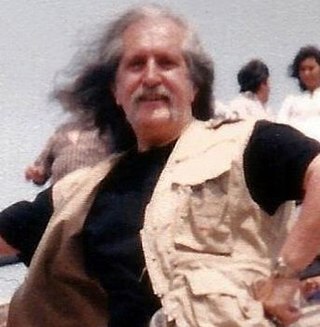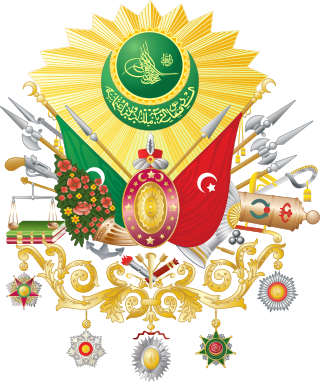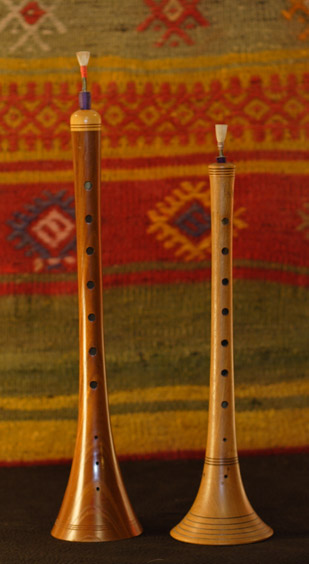
Mehmet Barış Manço, better known by his stage name Barış Manço, was a Turkish rock musician, singer, composer, actor, television producer and show host. Beginning his musical career while attending Galatasaray High School, he was a pioneer of rock music in Turkey and one of the founders of the Anatolian rock genre. Manço composed around 200 songs and is among the best-selling Turkish artists to date and the winner of the most awards. Many of his songs were translated into other languages including English, French, Japanese, Greek, Italian, Bulgarian, Romanian, Persian, Hebrew, Urdu, Arabic, and German. Through his TV programme, 7'den 77'ye, Manço travelled the world and visited many countries. He remains one of Turkey's most popular public figures long after his death.
Turkish hip hop refers to hip hop music produced by members of the Turkish minority in Germany, and to a lesser degree by hip hop artists in Turkey. The Turkish minority, called the Turks, first drew inspiration from the discrimination and racism they received while living as migrant workers in Germany in the 1960s. Turkish hip hop uses Arabesk music, a folk style that finds its roots in Turkey during the 1960s, and is influenced by the hip hop music of America and Germany. Album artwork, lyrical content, and the Turkish language are used by hip hop artists to express their uniquely Turkish identity.
The roots of traditional music in Turkey span across centuries to a time when the Seljuk Turks migrated to Anatolia and Persia in the 11th century and contains elements of both Turkic and pre-Turkic influences. Much of its modern popular music can trace its roots to the emergence in the early 1930s drive for Westernization.

Raï, sometimes written rai, is a form of Algerian folk music that dates back to the 1920s. Singers of Raï are called cheb as opposed to sheikh, the name given to Chaabi singers. The tradition arose in the city of Oran, primarily among the poor. Traditionally sung by men, by the end of the 20th century, female singers had become common. The lyrics of Raï have concerned social issues such as disease and the policing of European colonies that affected native populations.
Kanto is a popular genre of Turkish music.
Germany claims some of the most renowned composers, singers, producers and performers of the world. Germany is the largest music market in Europe, and third largest in the world.

The South African music scene includes both popular (jive) and folk forms like Zulu isicathamiya singing and harmonic mbaqanga. Other popular genres are marabi, kwaito,house music, pop music, isicathamiya, gqom, rock music, hip hop and amapiano.
Music has been an integral part of Egyptian culture since antiquity in Egypt. Egyptian music had a significant impact on the development of ancient Greek music, and via the Greeks it was important to early European music well into the Middle Ages. Due to the thousands of-years long dominance of Egypt over its neighbors, Egyptian culture, including music and musical instruments, was very influential in the surrounding regions; for instance, the instruments claimed in the Bible to have been played by the ancient Hebrews are all Egyptian instruments as established by Egyptian archaeology. Egyptian modern music is considered as a main core of Middle Eastern and Oriental music as it has a huge influence on the region due to the popularity and huge influence of Egyptian cinema and music industries, owing to the political influence Egypt has on its neighboring countries, as well as Egypt producing the most accomplished musicians and composers in the region, specially in the 20th century, a lot of them are of international stature. The tonal structure music in the East is defined by the maqamat, loosely similar to the Western modes, while the rhythm in the East is governed by the iqa'at, standard rhythmic modes formed by combinations of accented and unaccented beats and rests.

Tarkan Tevetoğlu is a Turkish singer-songwriter. Since the early 1990s, with the successful sales of his albums, he has been a prominent figure of pop music, recognized in Turkey and worldwide.
Anatolian rock, or Turkish psychedelic rock, is a fusion of Turkish folk music and rock. It emerged during the mid-1960s, soon after rock groups became popular in Turkey. Most known members of this genre includes Turkish musicians such as Barış Manço, Cem Karaca, Erkin Koray, Selda Bağcan, Fikret Kızılok alongside bands such as Moğollar, Kurtalan Ekspres, 3 Hürel, and Altın Gün.

Bülent Ersoy is a Turkish singer and actress. She is known as one of the most popular singers of Turkish music, nicknamed Diva by her fans. Ersoy has many famous hits such as "Ümit Hırsızı" (Hope Thief), "Geceler" (Nights), "Beddua" (Curse), "Maazallah" (God Forbid), "Biz Ayrılamayız" (We Cannot Break Up), and "Sefam olsun" (I Enjoy Myself). Ersoy has published more than thirty albums so far and has made a name for herself in Turkish music history.

İbrahim Tatlıses is a Turkish folk singer and former actor of Arab-Kurdish descent. Since the 1970s he has been one of the best-known and most successful singers of the pop Arabesk style. Tatlıses has recorded 42 albums, including notable albums such as Ayağında Kundura and Selam Olsun and was the host of the highly popular television programme İbo Show. He was also a leading actor that appeared in several dozen films, and also has had many business ventures.

Ottoman music or Turkish classical music is the tradition of classical music originating in the Ottoman Empire. Developed in the palace, major Ottoman cities, and Sufi lodges, it traditionally features a solo singer with a small to medium-sized instrumental ensemble.
Chalga is a Bulgarian music genre. Chalga or pop-folk is essentially a folk-inspired dance music genre, with a blend of Bulgarian music and also primary influences from Greek, Turkish and Arabic.

Turkish folk music is the traditional music of Turkish people living in Turkey influenced by the cultures of Anatolia and former territories in Europe and Asia. Its unique structure includes regional differences under one umbrella. It includes popular music from the Ottoman Empire era. After the foundation of the Turkish Republic in 1923, Turkish President Mustafa Kemal Atatürk ordered a wide-scale classification and archiving of samples of Turkish folk music from around the country, which, from 1924 to 1953 collected more than 10,000 folk songs. Traditional folk music was combined with Western harmony and musical notation to create a more modern style of popular Turkish music.

Mizrahi music refers to a music genre in Israel that combines elements from Europe, the Middle East and North Africa; and is mostly performed by Israelis of Mizrahi Jewish descent. It is usually sung in Modern Hebrew, or literary Hebrew.

Orhan Gencebay is a Turkish musician, bağlama virtuoso, composer, singer, arranger, music producer, music director, and actor. Gencebay was born in the coastal town of Samsun on 4 August 1944. He is of Crimean Tatar descent. In 1998, he was named a State Artist of Turkey.
Müslüm Gürses, born Müslüm Akbaş and called Müslüm Baba, was a popular Turkish arabesque singer and actor.
Fergan Mirkelam (born 20 May 1966, Istanbul) is a Turkish singer. He first became known with his song "Her Gece" in 1995.










